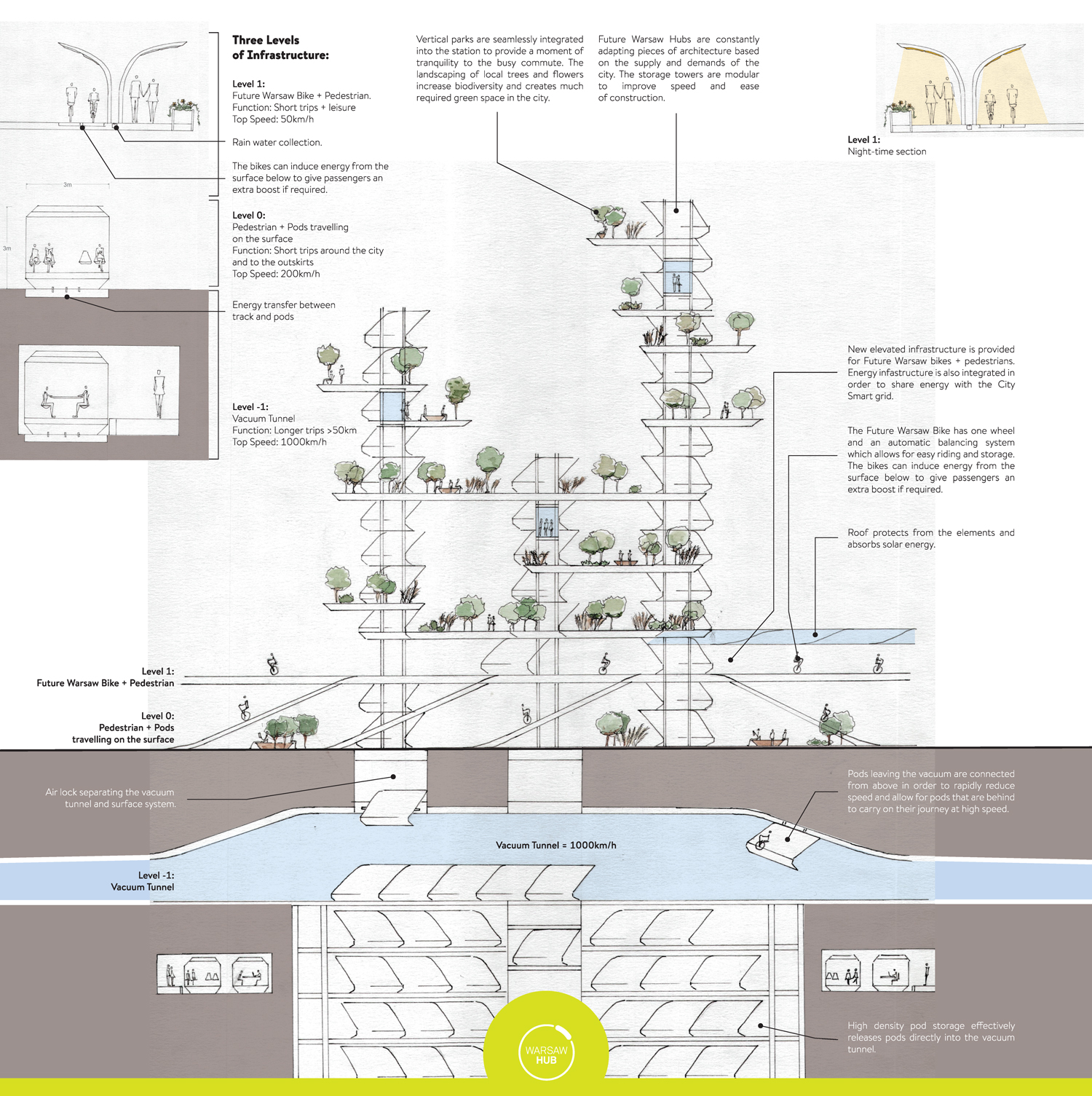Designing the rail and transport stations of the future
We strongly believe our young engineers should be encouraged to develop their conceptual thinking, presentation skills and engage in creating forward thinking solutions. To aid this we recently set our Young Engineers Forum the challenge of designing the ‘Rail and Transport Stations of the Future’.
After several months of concept development and guidance from across the practice, the winning entry came from the Future Warsaw Team. Their exciting concept uses a range of recent advances in data collection and personal technology to help solve infrastructure challenges in the Polish capital.
The concept titled ‘Warsaw Hub’ incorporates a self-learning HUB APP and data collection systems which aim to ensure the appropriate mode of transport is chosen for every journey depending it’s purpose and length. For example Smart Bikes could be used for short trips, medium speed ‘Pods’ for mid-length journeys within metropolitan areas, and high speed Vacuum Tunnels for longer journeys between major cities. All served by Satellite Hubs in strategic locations. The design incorporates three levels of infrastructure, outlined below:

The infrastructure would be integrated with the smart grid, balancing the energy between renewable energy sources, Pod batteries and the local power system. Green spaces surrounding the infrastructure and modular Pods with different functionalities would boost wellbeing for users, and time-use efficiency for operators.
“I was struck by the very refined communication skills used in the presentation of the ideas as much as the ideas themselves.”
Hiro Aso, Head of Transportation, Gensler Architects
See how the Warsaw Hub concept would work:
Congratulations to Anastazja Pazura, Tomasz Ziolek, Piotr Chmielewski, Beata Jackowska, Archit Goyal, William Holley and Anna Jancy – aka Team Future Warsaw – who beat off stiff competition from the other teams in our global Young Engineers Forum that collaborated to look at fresh ideas for the transport stations of the future.
On winning the prize, the team highlighted the importance of support and inspiration from the practice:
The past few months have been an exciting and unforgettable adventure for our team. Starting from initial sketches and ideas, through to discussions, to final delivery, we have presented our vision of the transport system of the future.
The jury’s support, advice and inspiration during the competition were invaluable in developing our solution. We are extremely proud to have won the global competition, and to take part in shaping the future.
Future Warsaw Team
Judge and Global Rail Sector Leader at Buro Happold, Justin Phillips, commented:
“In true Buro Happold fashion we have challenged conventional wisdom with some novel lateral thinking around modes of future transport and interchange. It has been an enjoyable process to engage the teams through the development of their ideas, the level of interest and to see how the thinking has evolved. It has been a very difficult challenge to distinguish some quality entries but Team Warsaw stood out for the depth and breadth of their thinking across a number of themes around passenger experience, viable technology and an elegant station layout that could be readily visualised within a wider national and international transport system.”
The judging panel also included external experts, including Hiro Aso who is Head of Transportation at Gensler Architects, and David Joy the Chief Executive at LCR, who commented:
“I was very impressed with all the finalist’s submissions and presentations. It was clear to me that they had achieved a very high standard of project work both in terms of outputs and in joint working. It was obvious that a considerable amount of work and thought had gone into looking into the future and responding to the challenges that they foresee. The inter-office/ international working was of particular note. I found it interesting that all teams identified common themes based on transport solutions in the future being focused on an individual’s whole journey and digital applications playing a big part in determining and charging for journeys. All the teams should take pride in their approach and achievements in participating in this competition. Well done!”